THE EASYBEATS
Sydney/UK 1964-69
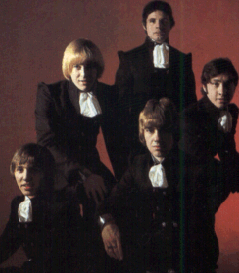 |
Tony Cahill (drums) 1967-70
Dick Diamonde (bs, vcls)
Gordon "Snowy" Fleet (dr) 1964-67
Harry Vanda (gtr/vcls)
Stevie Wright (vcls/perc)
George Young (gtr/vcls/kybds)
At left - The Easybeats at the
height of their fame in 1967:
Clockwise from left: Stevie Wright, Harry Vanda, Snowy Fleet,
George Young, Dick Diamonde.
|
History
To describe The Easybeats as "Australia's
Beatles" is not to damn them with faint praise. They were without
question the best and most important Australian rock band of the 1960s,
and their string of classic hit singles set the benchmarks for
Australian popular music. They established a unique musical identity,
and they became our first homegrown rock superstars, and for quality,
inventiveness and originality their work is arguably unmatched by any other Australian band of the period. The Easybeats scored fifteen Top 40 Singles in
Australia between 1965 and 1970, including three No.1 hits.
Chief among their many achievements, the Easybeats hold the unique
honour of being our first bona-fide rock group to
have an major overseas hit record - the legendary "Friday On
My Mind". They were also one of the few major Australian bands
of their day to perform and record original material almost
exclusively.
Their influence -- both during and after their meteoric 5-year career
-- cannot be understated and The Easybeats deserve to be ranked as one
of the greatest bands of the last 40 years. Many leading Australian and
overseas acts -- Johnny O'Keefe, Sports, Divinyls, INXS, The Saints,
Gary Moore, David Bowie -- have covered Easybeats songs, and artists
like Lou Reed and Bruce Springsteen have praised their work. It's a
classic 'rags-to-riches' tale, but is also a story of spectacular
success that is interwoven with personal tragedy, missed opportunities
and bitter disappointments.
The history of the Easybeats has been recounted in detail by rock
historian Glenn A. Baker, and I must acknowledge
his liner notes for the original 1980 LP version of the Absolute Anthology compilation, which are the primary source for this
essay.
1964
To fully appreciate their impact, it's important to understand
the music scene onto which the future Easybeats were about to launch
themselves. In 1964 the Australian popular music was undergoing
significant changes. The previous five years had been by-and-large a
bland period. The charts had mostly aped American trends and were
dominated by a succession of clean-cut, innocuous acts, typified by the
so-called "Bandstand Family" -- Col Joye, Little
Pattie, Lana Cantrell, Judy
Stone, Bryan Davies, Laurel Lee,
Sandy Scott, The Delltones. They
all had considerable success in the early 60's, were all regular guests
on the TCN-9 television network's Bandstand
(a
direct copy of Dick Clark's American program), and it's no coincidence
that most were signed to Festival Records, for whom
Bandstand proved a promotional goldmine.
One of the few stand-out exceptions to this easy-listening
fare was "The Wild One", Johnny
O'Keefe, who drew inspiration directly from classic
rock'n'roll -- Elvis, Bill Haley and Buddy Holly -- and from the black
R&B/soul scene which was gaining momentum in the USA. His first
hit was a version of the Isley Bros "Shout", and he scored an
unprecedented five No.1 Australian Singles between 1958 and 1963.
O'Keefe was also one of the first Australian rock acts to attempt to
break into the American market. In 1959 he successfully moved into
television, hosting the ABC's legendary Six O'Clock Rock,
but by the time the new wave of 'beat' groups began to emerge in
1962-63, O'Keefe's career was on the wane, undermined by the changing
nature of the music scene and by O'Keefe's health problems (including
the terrible car accident which almost killed him in 1960).
The only other significant features were the succession of
imported dance crazes like The Twist, and the hugely influential surf
music scene, spearheaded by vocal groups like the Beach Boys
and Jan & Dean and by instrumental acts
like Dick Dale, The Shadows,
and Australia's premier surf band, The Atlantics, whose
1963 single Bombora is a
classic of the genre. Sydney even had its own homegrown surf-dance
craze. The Stomp launched the career of Little
Pattie and was massively popular in the beachside suburbs of
Sydney -- incredibly, the 1963 Australian National Stompin'
Championships, held at Lane Cove National Park, drew a crowd of some
45,000 people!
The autumn/winter of 1964 was a watershed for popular music in
Australasia. The
emergence of the Beatles in 1962-3 had revolutionised popular music
worldwide, and many young bands now looked to the Fab Four as the new
paradigm. For several months beforehand there was an intense media
campaign to promote the Beatles' impending Australian visit, and in
June the true scale of the new phenomenon was made clear when The
Beatles arrived for their historic three-week tour. They were greeted
by massive crowds and scenes of hysteria never before witnessed in this
country. On their Adelaide visit, it was estimated that at least
300,000 people -- virtually half the city's population at that
time -- turned out to see them.
In the wake of the Beatles' visit, hundreds of new "beat"
groups were formed around the country by teenage kids fired up by the
example of The Beatles. With Australia so far from the centres of the
new music -- London, New York and Los Angeles, the scene was ripe for a
home-grown band to reap the level of success that The Beatles had
proven was possible in Australia.
The birthplace of The Easybeats was the Villawood Migrant
Hostel, in Sydney's south-western suburbs. The hostel was a
halfway-house for hundreds of thousands of new arrivals from Europe and
the UK. Johannes "Harry" Vandenburg (b.1946)
arrived at Villawood with his family early in 1964. Back in Holland he
had gained notoriety in a Shadows-style instrumental band band called
The
Starfighters, and although only 17 he was already an
accomplished lead guitarist. Through his interest in music he soon met
fellow Dutchman Dingeman "Dick" Vandersluys
(b.1947); Dick's family had migrated in the early 1950s and lived
nearby.
(They were also were staunch Jehovah's Witnesses, and remained bitterly
opposed to Dick's pursuit of worldy fame and success throughout his
career, seeing it as a form of idolatry). The hostel played host to a
thriving musical scene, and the pair became part of the many regular
jams and temporary bands that formed and played at the hostel dances.
The hostel's kitchen and shower blocks were favoured venues, partly
because of the acoustics and partly because they were well away from
the living quarters!
Early in the year Harry and Dick met a diminutive 15-year-old
singer called Stevie Wright (b.1948) fronting a
band called called The Outlaws at Susie Wong's
Coffee Lounge in Sydney. Stevie, from Leeds in England, had come to
Australian in 1958 and after a few years in Melbourne his family
settled in Villawood, near the hostel. Stevie soon moved on to another
teenage band called Chris Langdon and the Langdells
(who were converted from a surf band into Beatles clones after being
introduced to The Fabs' music by The Bee-Gees).
After meeting Harry and Dick, he fell in with the jamming scene at the
hostel, and there he also became firm friends with another of the
hostel's aspiring young rockers, guitarist/singer George Young
(b.1948) whose family had recently migrated from Glasgow. One of
George's primary musical influences was his older sister Margaret, who
turned George and his six brothers onto rock and R&B at an
early age via her collection of classic R&B and early rock.
(George's oldest brother Alex was already a rising musician and had
remained in the UK when the family emigrated).
Drawn together by their love of music, and their shared
admiration for the Beatles, Harry, George and Dick had decided to form
their own band. Undoubtedly, for hostel boys from such disparate
backgrounds, trying to fit into a strange new culture, being in a group
gave them a sense of unity, purpose and identity that would otherwise
have been hard to come by. And the "fringe benefits" were even more
important, and a good deal more tangible to teenage boys: their long
hair immediately marked them out as 'rebels', and perhaps most
importantly (thanks to the Beatles) boys with guitars and moptops were
now a very desirable item for members of the opposite sex!
They tried out a number of singers, including John Bell (who
later fronted The
Throb) but they eventually offered the
spot to Stevie, who snapped it up. They still had no regular drummer,
but that problem was fortuitously solved when they met another English
immigrant, Gordon Fleet (b. 1940) on a Sydney train. Fleet, whose jet
black hair earned him the nickname "Snowy", had two invaluable assets
--
he was from Liverpool, and he was a competent drummer, who had only
recently left
a working Merseybeat band (The Mojos) to come
to Australia. They exchanged addresses, and a few days later he was
invited to join.
Snowy was several years older than the rest of the band, and
already married with a daughter. At first he took on the role of
leading and managing the group; he suggested their stage outfits and it
was he who came up with their name: The Easybeats, which
of course included that all-important reference to The Beatles. The
next step was the adoption of "anglicised" stage names for the two
Dutch members of the group -- Hendrickus Vandenburg became Harry
Vanda, and Dingeman Vandersluys became Dick Diamonde.
With the group established, they rehearsed solidly for two months, and
over the latter half of 1964 they began playing at dances and clubs,
often for no fee.
After being kicked out of a pub in Goulburn St,
Sydney (for being "too loud and too filthy") the band walked up Oxford
St and came upon the now legendary Beatle Village.
In the first of several lucky breaks, the doorman turned out to be
Dutch, enabling Harry and Dick to talk their way into a late-night
spot. The management and patrons were impressed enough for the group to
be offered a regular Thursday night residency. This was soon extended
to three nights per week, and the band were on their way to becoming a
major attraction. They were offered a better-paying gig at rival venue
The Bowl, and then were snapped up by impresario John
Harrigan for his famous venues Surf
City and The
Beach Hut. As the end of the year approached, The Easybeats
were well on the way to becoming the leading beat band in
Sydney.
11 December 1964 was a significant day for the band. In the
morning, Harry married his girlfriend Pam. That evening, they had a
fateful meeting at a dance in the northern suburb of Hornsby with
real-estate agent Mike Vaughan, who immediately
offered to manage them. Although the group initially declined
his management offer,
they did agree to his getting extra work for them. However, after being
ripped off by an unscrupulous promoter at the end of their two-week
Xmas residency in Mildura, S.A. they went back to Vaughan and accepted
his offer.
1965
Although The Easybeats were critical of his management in
later years, Mike Vaughan undeniably provided crucial breaks for the
band. In January, he hosted a successful cocktail party and dance, to
launch the band to local DJs and industry people. The major break for
the Easys came through Vaughan's friendship with a young Sydney music
publisher and aspiring record producer. Ted Albert had
already achieved considerable success with Billy
Thorpe, and when Vaughan introduced The Easybeats to him, one
private performance was enough to convince Ted that he had a hot
property on his hands.
Although a relative novice, Albert had an intuitive gift for
selecting material, finding the right sound and honing the 'feel' of a
song, skills later highly praised by George Young. He took over as the
groups's producer, and it proved to be a great collaboration. Within a
week they were signed Albert Productions and had a
recording contract with EMI's Parlophone
subsidiary. Albert taped a
series of demos in the old 2UW Radio Theatre in George St, Sydney --
"The Bells", "Say", "I Who Have Nothing" and "For My Woman". He
selected "For My Woman" as the first single, and it was released in
March 1965.
Although the recording itself is pretty rough, many beat
groups of the time would have killed for a first single as good. It
shows the band's abilities in place virtually from the first -- they
had great original material, filled with catchy vocal and instrumental
hooks (George Young was already developing into one of the very best
pop writer/arrangers of the 60s). Their sound was tight, raw and
aggressive, and what they may have lacked in polish they made up for
with energy to burn. They were backed by the rock-solid (and hugely
underrated) rhythm section of Dick, Snowy and George, and it must be
said that in Harry Vanda they possessed one of the era's finest
guitarists, providing exemplary lead breaks which were fluid, assured,
inventive and concise. Stevie Wright was one of the truly great rock
frontmen. Although perhaps not the greatest singer in technical terms,
Stevie's strengths were his power, his sure delivery and his innate
sense of musical drama and fun. His livewire stage presence - the
onstage leaps and backflips, his tambourine technique - became a
trademark, and a huge influence on later singers like the late Bon
Scott of AC/DC). Above all - they rocked.
"For My Woman" was in fact the very first Young-Wright song,
and Stevie and George co-write most of the bands's early Australian
hits. It was a productive partnegsubip and even before the first
session, they band had at least 20 more originals stockpiled, all
written around the piano at the Young's Burwood home.
"Stevie and George were amazingly
prolific writers, Stevie having a knack for knocking out quick succinct
rock lyrics, and George with his exceptional capacity for melody and
intense musical structure." (Baker, 1980)
Radio interest in the single was moderate at best, but the
Easybeats' local popularity helped it nudge into the lower end of the
Sydney charts. (The Beatle-ish flipside "Say That You're Mine" was also
the first product of the soon-to-be-legendary Vanda-Young team, but
since Harry was still learning English at that early stage, the main
lyric-writing duties usually fell to Stevie).
The follow-up single - and the record that changed everything
- was another hard-driving original, "She's So Fine". Stevie's wild
opening scream and Snowy's pounding drumbeat left no doubt about the
band's intentions, and Australia said "yes, please!".
Released in May, the single rocketed to #1 in Sydney within a couple of
weeks, and by June it was a smash in Melbourne, and around the country.
The crucial Melbourne breakthrough came about largely through the help
of veteran manager Ron Blackmore who at that time
was manager of pop duo Bobby
& Laurie. Ron was collared by Vaughan outside the 2UW
studios early in 1965, andhe was inveigled to come and listen to the
Easybeats. Blackmore was knocked out and he immediately recommended
that they visit Melbourne, where, he said, there were literally
hundreds of dances being run every Saturday night.
Blackmore generously loaned the destitute band £150
to get them there; at that stage they were so broke that they had to
hide their gear to save it from repossession! Vaughan nobly traded in
his prized Jaguar to buy a station wagon, and they headed to Melbourne
for their first visit in March 1965. Blackmore had prepared well -- by
the time the Easys arrived, they had over £1000 worth of
bookings, playing up to five gigs per night. In spite of the amount of
work, the first Melbourne trip was rough going - they stayed in a
squalid boarding house in St Kilda, and had barely enough money for
food. According to Glenn A. Baker, they were reduced to boiling potato
peelings for soup, except on paydays, when they could lash out and
share a bag of hot chips between them. Stevie apparently became so
weakened that he collapsed on the set of the 0-10 Network's The
Go!! Show and had to be taken to hospital.
The Easybeats were an instant success with Melbourne
audiences, and while there they recorded the backing track for their
new
single, "She's So Fine", produced by the recently arrived Roger
Savage and recorded at Bill Armstrong's
new studio in Melbourne. But it was their second Melbourne trip that
really
cracked them commercially -- albeit by accident. As recalled by George
Young, Vaughan organised a reception for Melbourne DJs in the bar of
the luxurious Windsor Hotel, to promote the new single. A group of
labourers who were drinking there began abusing the boys; never scared
of defending their honour, the group rose to the challenge and within
minutes a fight had erupted. The diminutive Easybeats took a hiding,
and left thinking that they had ruined the event. It turned out that
the reverse was true - they found out that the DJs thought it was the
best reception they had ever attended, and the single hit the Melbourne
airwaves the next day.
With "She's So Fine" now at the top of the charts, "For My
Woman" was re-released and by July it had peaked at #5. Almost
overnight, The Easybeats were a household name, but with instant
success came all the attendant problems, as George Young recalled to
Rolling Stone in 1976:
"...with a No.1 record, that's where all
the bullshit started. We weren't really playing anymore, we were just
trying to satisfy demand ... It took all the enjoyment out of actually
playing. From then on the gigs became a chore. We went out and did our
half hour, nobody could hear us ..."
Like so many other popular groups of the era, the Easybeats'
career was tightly controlled by their manager and record company, who
were keen to make the most of their good fortune while it lasted. (Even
the Beatles at that stage had not foreseen their success becoming a
long-term career.) Their lives became an blur of concerts, photos
shoots, promotional appearances, TV shows and interviews. They were
insulated from the outside world and had all their material needs
catered for but - apart from the music - they had little control over
what they did or when they did it. Vaughan put the band on an allowance
(a paltry $10 per week) and even fined them for "bad behaviour". Just
like the Beatles, their public image was carefully 'massaged' to
maximise their appeal - Snowy's age was 'trimmed' by 5 years, Snowy and
Harry's marriages were concealed; visits to or from wives/girlfriends
were strictly controlled, sometimes even forbidden, and when permitted
had to be conducted in strict secrecy. Fan hysteria was carefully
whipped up by Vaughan, in collaboration with radio, TV and teen
magazines like Everybody's. The Easybeats'
popularity rapidly escalated, and the phenomenon was soon dubbed
"Easyfever" by the media. Glenn Baker sums it up admirably:
"It is not naive to say that that no
incident of Beatlemania or Rolling Stone fever anywhere in the world
surpassed the absolute peak of Easyfever. Airports, TV stations,
theatres and hire cars were reduced to rubble, fans were hospitalised
and general mayhem reigned wherever they turned up."
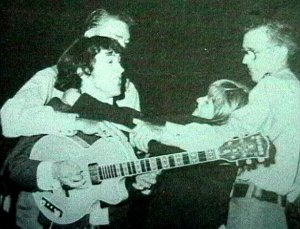 And just like the Beatles, the Easybeats became
prisoners of
their own fame. Fans followed them everywhere, routinely mobbing them
at airports, hotels and venues. On several occasions the group had
genuine reason to fear for their safety. When a fan magazine stupidly
printed the address of the Young's family home in the Sydney suburb of
Burwood, 300 female fans invaded; twenty managed to force their way
inside, trampling George's little brother Angus and pillaging the house
before being removed by police. The madness escalated through 1965 - a
near-riot broke out at a TV appearance in Sydney, and the hysteria
peaked in December with their notorious appearance at the 4BC
Sound Spectacular at Brisbane's Festival Hall.
And just like the Beatles, the Easybeats became
prisoners of
their own fame. Fans followed them everywhere, routinely mobbing them
at airports, hotels and venues. On several occasions the group had
genuine reason to fear for their safety. When a fan magazine stupidly
printed the address of the Young's family home in the Sydney suburb of
Burwood, 300 female fans invaded; twenty managed to force their way
inside, trampling George's little brother Angus and pillaging the house
before being removed by police. The madness escalated through 1965 - a
near-riot broke out at a TV appearance in Sydney, and the hysteria
peaked in December with their notorious appearance at the 4BC
Sound Spectacular at Brisbane's Festival Hall.
Left: stage hands try to
separate George Young and an ardent female fan
The first half of the show, featuring local bands, went
smoothly but trouble started right after interval. As MPD
Limited began their set, fans tried to rush the stage and
police were called in to keep them off. By the time the next act Tony
Worsley & the Blue Jays came on the capacity crowd of
5000 was near-hysterical, and when the Easybeats hit the stage
pandemonium ensued. Hundreds of fans repeatedly broke through the
police cordon, threw chairs and other objects on stage, and dozens were
injured in the crush. The police stopped The Easybeats' performance
after only 17 minutes. When the boys tried to make their escape in a
taxi it was pursued through the streets and caught when the driver
foolishly stopped at traffic lights. The car was surrounded and the
terrified occupants were trapped inside as the fans trampled over the
car and even tried to overturn it, causing considerable damage. (This
was an experience repeated by Melbourne fans who broke through police
barriers and nearly succeeded in toppling their limousine).
On the road, long-serving road manager Sam Horsburgh (who was
married to George's sister Margaret) regularly had to reconnoitre cafes to
ensure it was safe for the band to enter, since they were often
victimised for their long hair and 'mod' clothes. Another hazard
was jealous boyfriends of female fans. From June 1965 until their first trip to England in July '66,
the Easybeats were Australia's top pop act, and they dominated the
charts with hit after hit. The band worked like slaves yet, somehow,
during the welter of concerts, TV and radio apperances and other commitments, they managed to
write, record and release four singles, three EPs and two albums within
a year. Their third single, released in August, was another classic,
and an instant hit -- "Wedding Ring" (later covered by Sports).
In September the first LP Easy was released and
rapidly became one of the best-selling albums of 1965.
Ironically the band had already set high (perhaps
unachievable) standards for themselves, and were disappointed with
their performance in the singles charts. George later recalled:
"..as early as it was, we went through
that musician's phase where we just tried to get clever ... With that
track we tried to be commercial, but at the same time, be a little bit
different. It paid off, but it wasn't as big as hit record as it should
have been. We decided then that we wanted to get out of Australia."
Another EP, She's So Fine was issued in
October '65, and their fourth single "Sad & Lonely &
Blue" the following month. Although their nationwide popularity was undoubted,
it's curious each of their first four singles had charted progressively lower than its predecessor -- #1 with
"She's So Fine", #5 with "For My Woman", #13 with "Wedding Ring", and #26 with "Sad & Lonely & Blue". Young and the band
responded by abandoning "all the pretensions" and knocking out what was
-- for them -- formulaic and deliberately chart-friendly material.
Whatever the Easys' personal feelings, the fans loved it and 1966 took
them to even greater heights.
1966
The first Easybeats single for 1966 was issued in January and
immediately became a Top 10 double-A hit. "Women (Make You Feel
Alright)" was co-written by Stevie and George, and backed by "In My
Book" a soppy, melodramatic Vanda/Young ballad custom-written for
Stevie, who by now was the 'face' of the band. (According to Young,
Stevie used to stick his fingers in his eyes or rub onions into
them to get the tears flowing on cue for TV performances! The flow
of records continued unabated -- the Easy As Can Be
EP in February, their second album It's 2 Easy in
March, and their sixth single (another Top 10 hit) in April.
"Come and See Her" was written to spotlight bass-player Dick
Diamonde. The song is a masterpiece of compressed sexual drama, played
out through the call-and-response between Stevie and Dick, whose
booming bass voice intones the tag line ("Come and see her") through
the verses, in response to Stevie's increasingly frantic pleading. The
arrangement inexorably builds the tension, increasing in volume, adding
more sounds, shifting up through the keys, until it reaches the climax
with Stevie's wailing lead vocal, Harry and George moaning orgasmically
in the background, against the relentless drone of Dick's voice.
Harry's superb 16-bar solo is yet another masterpiece.
As the band toured endlessly around the country through early
1965, Vaughan had been busy preparing for their departure. He visited
the US and after initial disinterest was able to win over the United
Artists label - on what was supposed to be his last day in New York! 10
days of negotiations led to a ground-breaking 5-year contract for
overseas releases, and Vaughan returned home in triumph. Meanwhile,
Albert and the group had been hard at work recording, and prior to
departure they had a new EP and LP in the can to keep the flow of
records going while they were away in England. Their departure was now
set, scheduled for July 14, 1966.
In late June the band did a three-week tour of South
Australia, and then flew straight to Sydney to record a 'farewell'
television special for the 7 Network on Sunday July 3. The Easybeats Coca
Cola Special is one of the icons of Australian pop TV and
is,
to quote Glenn A. Baker, "undiluted magic".
Supported by Janice Slater, Tony Worsley & the Blue
Jays and Billy Thorpe,
the special culminated with band performing a 20-minute set, presenting
their past hits, including "Women", "In My Book", "Come And See
Her","Wedding Ring", and "She's So Fine" as well as previewing the
forthcoming tracks "Sorry" and "I'll Make You Happy". The fact that it
is mimed does not detract at all, and it remains a vital and enduring
document of the band at their peak. Surrounded by a enthusiastic live
audience, and augmented by a fab troupe of go-go dancers, The
Coca-Cola Special captures the essential excitement that the
band generated, and we also see some of the real hysteria, through
intercut film footage of the band being mobbed by fans and performing
in concert.
Everything looked rosy for The Easybeats -- a string of hit
records behind them, a TV special in the can, a record deal with a
major overseas label in place, and a trip to England imminent - but it
was at that moment that tragedy struck. After filming the Special,
Harry Vanda returned home to his Sydney flat in the early hours of
Monday July 4 to find his wife dead. Distraught that she was not
allowed to go to England with him, Pam Vanda had committed suicide by
taking an overdose of sleeping pills.
In spite of this terrible tragedy and the ensuing media
frenzy, the plans for the trip were not altered and the band had to
soldier on with all the requisite media commitments. The grief-stricken
Harry sent his 5-month-old son to be cared for by his parents in
Holland, and on the following Thursday (July 10), The Easybeats,Vaughan
and Horsburgh flew out for London.
The band was scheduled to do a brief 'farewell' gig for Perth
fans during the stopover there, playing on a temporary stage on the
tarmac - but it turned into another 'Easyfever' riot. As soon as they
touched down, 4000 assembled fans broke down the perimeter fence and
surrounded the plane; the planned performance had to be immediately
cancelled. Then an anonymous bomb threat was made, requiring all the
passengers to leave the plane - which would have forced the group out
into the waiting arms of the frantic crowd. After a brief panic, The
Easybeats were smuggled out an emergency exit into a catering van and
driven to the end of the runway, where they hid for half an hour until
they rejoined the plane.
Arriving in London the Easybeats contingent crammed into a
flat in Willesden Green and immediately did the rounds of the London
clubs. The first band they saw was The Move at the
Marquee, who according to Harry were "so good we almost
packed up and went home."
Their absence did nothing to affect their popularity back in
Australia: the Easyfever
EP was released in July
and sold so well that it charted as a Top 10 single, coming in at #7 on
the first ever Go-Set
national singles chart,
published on 5 October 1966. The Easyfever EP included another
instant
classic, "I'll Make You Happy" (covered by Divinyls in
1982 on the b-side of their "Science Fiction" single). The song was
another mark of George Young's songwriting skills, with a solid-gold
riff, a great vocal hook, in which Stevie 'reveals' the opening line of
the verses word by word, and a superb solo by Harry.
Ted Albert arrived in August, and the band recorded at least
one track ("Baby, I'm A Comin'") with him at Abbey Rd. They were
satisfied with the results, but United Artists were not, so they handed
the group to renowned producer Shel Talmy, who was
already world-famous fame for producing The Kinks
and The Who. Thus ended the 'golden era' of their
collaboration with Ted Albert, although they remained friends and
business associates in years to come.
Although they were now perilously short of money (Vaughan had
to wire home for more), The Easybeats returned to the studio in
September with Talmy and cut four new tracks - "Remember Sam", "Made My
Bed, Gonna Lie In It", "Pretty Girl" and "Friday On My Mind". The
choice of single was obvious. "Friday On My Mind" is a perennial
classic, and a genuine working-class anthem. It contains one of
Stevie's best vocal performances, and has daunted generations of
aspiring guitarists with its fiendishly tricky, Eastern-influenced
interweaving guitar parts.
"Friday On My Mind" was also a significicant turning point
within the band -- it was the first major A-side release written by
Vanda & Young, and from this point on, their songwriting team
became the major focus in the group. It was a huge leap forward for
them as writers. Another interesting feature is that they largely
dispensed with one of the highlight features of their earlier singles
-- Harry's marvellous guitar solos.
Over the years "Friday" has been praised by scores of writers
and critics, and lauded by many of the world's best singers and
songwriters, including Bruce Springsteen. David Bowie paid tribute to
the Easybeats by covering the song on his 1974 album Pinups.
"Friday On My Mind" was released in the UK in October, but in
the flood of outstanding music being released at the time it received a
poor response. Luckily it was picked up by Radio Luxembourg, and by
loyal Australian DJs working in the popular pirate stations (like Radio
London) and it began getting heavy airplay.
The last three months of 1966 were undoubtedly the zenith of
the band's recording career back in Australia. October saw the release
of the new single "Sorry", and the Easybeats Volume 3
LP, both recorded in the months prior to the England trip. The 'hook'
of "Sorry" was George's innovative (and much-imitated) guitar
technique, in which he 'scratched' the pick across the stopped strings
to create an arresting percussive effect. Harry again excels,
contributing an extraordinary, almost backwards-sounding, raga-like
solo, and some fiery lead breaks during the concluding bars.
Although "Sorry" was not released overseas, it immediately
became a massive hit in Australia -- it debuted at #3 on the Go-Set
chart on 9 November and by the following week it was their second #1
single, staying in the national Top 40 for thirteen weeks. In November,
with "Sorry" at the top of the charts, "Friday On My Mind" was released
in Australia. Like "Sorry", it hurtled up the chart, debuting at #7 on
7 December. It reached #1 in the first week of January 1967, while
"Sorry was still at #7, giving The Easybeats two singles in the Top 10
simulaneously, and two successive #1 singles within two months.
The success of "Friday On My Mind" also demonstrated that, at
least in their homeland, The Easybeats could hold their own with the
very best the world had to offer -- it topped the Australian charts in
the face of competition from some of the greatest pop singles ever
released, including The Beach Boys' "Good Vibrations", Donovan's
"Sunshine Superman" and "Mellow Yellow", Tina Turner's "River Deep,
Mountain High" and The Monkees' "Last Train To Clarkesville".
On November 13, The Easybeats' made their UK live debut
at Brian Epstein's Saville Theatre. Dauntingly, they were at the bottom
of a
bill headed by The Four Tops, Cliff
Bennett & The Rebel Rousers and Bob Miller & The
Millermen, and the audience included Eric Burdon, Mick
Jagger, Charlie Watts and Georgie Fame. Although understandably
nervous, they were generally well received. Best of all, this
appearance also seemed to finally tip the balance with UK radio --
within days "Friday" was Top 50, and by Xmas it was in the Top 10,
peaking at No.6. Other artists (Rolf Harris, Frank
Ifield and The Seekers) had scored hits
overseas, but this was a first for an Australian rock band and it made
the Easys heroes back home. Over the next six months, aided by
promotion from United Artists, "Friday" stormed charts across the
world: going Top 20 in the USA, Top 10 in Germany, Holland, France and
Italy, and eventually selling over 1 million copies worldwide. Topping
off an incredible year, The Easybeats were voted Best Group in the 1966
Go-Set Pop Poll.
1967
As 1967 began, the group were at their peak, but as Glenn
Baker points out, problems were already beginning to surface. One was
their management. Mike Vaughan, like many managers of the era, followed
the dictum that "any publicity is good publicity" and he tried to
capitalise on the success of "Friday" by putting the band through a
series of silly and demeaning PR and publicity stunts, which they later
repudiated.
It was perhaps understandable for the time, but there could be
serious repercussions, besides the obvious risks of overexposure and
loss of credibility. The dangers were amply illustrated by what
happened to The Move later that year. Their manager
Tony Secunda was renowned for his flamboyant style
-- he had the band sign their record contract on the back of a topless
model - but he nearly cost them their career when he decided to include
a 'satirical' postcard with their single "Flowers in the Rain". The
card bore a caricature of PM Harold Wilson in bed with his mistress.
Wilson successfully sued for defamation and won all the royalties from
the single. To this day, writer Roy Wood has not
seen a penny from the song, although it is one of the most successful
Singles of the era and is still regularly anthologised.
But the most serious problem for the Easybeats was musical.
After the Xmas euphoria of a Top 10 hit came the New Year headache:
finding a suitable follow-up. This was a crucial moment in their
career, and it's arguable that here is where it began to unravel .
Although there was an obvious, gold-plated contender in the superb
"Pretty Girl" (one of the other tracks from the September '67 Abbey Rd
sessions) inexplicably, it was passed over, and relegated to the b-side
of a later single. Instead, they opted for a new Vanda-Young track,
"Who'll Be The One You Love", which was probably written in haste,
under pressure, and was clearly not in the same league as "Friday"
(George later dismissed it as "crap"). It was released in March in the
UK, and flopped. Ominously, UA didn't even bother to release it in
America.
Meanwhile the preceding months had been used to record tracks
for their new album with Shel Talmy. By all reports it was not a happy
working relationship and the track "Do You Have a Soul?" was supposedly
written about him, (as was the Who's "Waltz for a Pig") and this would
be the last time they worked together. In April "Who'll Be The One You
Love" was released in Australia, and went top 20, and the
disappointment of the new single was relieved by news that "Friday" was
now Top 20 in America. They also began their first, hugely successful
tour of Europe this month, supporting The Rolling Stones. Their superb
showmanship won many fans there, especially in Germany and Holland
(where Harry was feted like royalty) and over the next few years Europe
became their most loyal market outside Australia. In May the
Talmy-produced Good Friday LP was released in the
UK, but was not released in Australia until some time later, and then
in an altered form.
At the end of the European tour the group made a triumphant
return to Australia, arriving on May 13 for a national tour. Supported
by the Twilights (also just back from London), Ronnie
Burns, Larry's Rebels and a selection of
local supports in each city, they toured around the country to a
tumultuous welcome, climaxing with two rapturously received shows at
the Sydney Stadium. George recalled it as:
"... probably the highpoint of the
group's career ... we didn't come back with any of the standard excuses
for failure ..."
The group was given a civic reception at the Sydney Town Hall,
hosted by Lord Mayor John Armstrong, and the Sydney Daily
Mirror ran a week-long series on them story, entitled
"Million Dollar Story". Unfortunately this reportedly attracted the
interest of the taxation authorities, who began inquiries into the
band's financial affairs -- ironic, considering the band were hardly
any better off than when they left for England, with the five members
of this "million dollar" group still on a piddling $10/week allowance!
The tour concluded in Perth, but after this triumphant
homecoming came another disappointment. The frantic Australian tours of
1966 and the trip to England had kept Snowy Fleet away from home long
periods, and by his own admission he had been experiencing growing
anxiety over the separation from his wife and daughter. His wife
Maureen, who had gone to London to be with him, was not allowed to
return to Australia for the '67 tour, and he had not had not seen his
5-year-old daughter Mandy -- left in the care of her grandparents - for
almost 12 months. The stress became even greater after the suicide of
Pam Vanda (she and Maureen were best friends) and it reached a head
during the European tour. Reunited with his daughter in Perth, Snowy
made the difficult decision to leave the group. Maureen returned home,
and the Fleet family settled in Perth, where Snowy became a successful
builder.
Back in London, the group spent June and July regrouping and
recording. They auditioned 60 drummers seeking a replacement for Snowy;
the guernsey eventually went to Tony Cahill, former
drummer with Brisbane R&B legends the Purple Hearts, who was
then working in London. While Cahill was being recruited, the Easybeats
-- plus session drummer Freddie Smith and renowned
session keyboardist Nicky Hopkins -- went into the
famed Olympic Studios in Barnes, London (where Jimi Hendrix, The Move,
The Small Faces, Traffic, Family and The Rolling Stones cut many of
their seminal late 60's albums and singles) to record their next LP,
produced by Shel Talmy's erstwhile engineer, the now legendary Glyn
Johns.
This should have been the breakthrough
they needed and the sessions produced some of their best material to
date. But although an entire album was recorded, sequenced, mastered
and titled (Good Times) and a cover prepared, it was
never released. The band had become involved in a complicated
contractual wrangle, with five companies claiming rights over their
work. The immediate result was that Albert Productions, who had been
footing most of the bills, now closed their chequebook. With both Johns
and Olympic still unpaid, the record stayed in the can, and only two
cuts -- the magnificent title track, "Good Times", and the psychedelic
gem "Land Of Make Believe" managed to emerge, many months later. The
remaining tracks languished for another decade, until Raven Records
released them on the 1977 LP The Shame Just Drained.
In June, UA released the superlative psychedelic rocker
"Heaven & Hell". It was their last Talmy-produced single, with
Nicky Hopkins prominent on harpsichord, and some great bass playing by
Dick. It was released in June, with the wonderful "Pretty Girl"
relegated to the b-side, and became another Top 20 hit in Australia. By
rights, it should have been a double-sided hit for them worldwide. For
a while it looked set to restore their chart fortunes, especially in
the US, but once again bad luck intervened: just as it entered the
charts, the single was banned by various US stations, due to the line
"discovering someone else in your bed" and
supposed drug references. Inexplicably, it also failed in the UK.
Based on the success of "Friday", Vanda & Young had
naturally continued with that winning formula, packing remarkable
musical and lyrical innovation into a concise single format (what
George later called their "three minute operas"). When they saw one of
their best efforts fail, they effectively gave up trying. They began
making music primarily to please themselves, and according to George a
lot of similar material was shelved. Their fortunes were further
hindered by consistently poor timing and choices of material by United
Artists, and by lack of direction and support from both label and
management. From this point on, according to George "the rot set in".
The outcome was doubly lamentable -- abandoning any pretense of
'commerciality', the group went on to produce some of their most
outstanding material over the next year, but sadly many of the tracks
were only ever cut as demos, and the public never got to hear them
until years later.
In July the Talmy-produced Good Friday LP
was finally released in the UK and US. In August their first American
tour supporting Gene Pitney and the Buckinghams. They got off to a
shaky start, due to injury and illness, but their soon won hearts and
minds, as they had in Europe. Stevie also reportedly had a brief
relationship with renowned New York-based Australian journalist Lillian Roxon.
They cut a new track, "Falling Off The Edge Of The World" while in New
York (where Dick also met his future wife Charlene); it was
rush-released in the US and was highly praised -- and frequently played
-- by Lou Reed, who reportedly called it "one of the most beautiful
records ever made". The song was later re-recorded in England.
The next single, released in November, was "The Music Goes
Round My Head", a song inspired by Vanda & Young's interest in
bluebeat (the ska precursor which also inspired McCartney's "Ob-la-di,
ob-la-da"). They cut two versions -- one fast, one slow -- but UA oddly
chose the slower, less commercial version and it only barely made it
into the charts. This single is also particularly noteworthy as the
first official Vanda & Young production. They had kept their
eyes and ears wide open during sessions and within a year of arriving,
they were producing themselves, with superb results. At the
end of the year, Australia once again demonstrated its
unswerving loyalty by voting the Easybeats Top Group in the 1967 Go-Set
Pop Poll.
1968
During early 1968 the Vanda/Young team scaled new heights of
writing and production excellence with a string of superb singles --
but like "Heaven & Hell" they were largely overlooked by radio
outside Australia. In March they released the epic "Hello, How Are
You", which briefly took them back into the UK Top 20. The song was a
deliberate attempt by Vanda & Young to emulate the 'big ballad'
hits of singers like Tom Jones and Engelbert Humperdink. It's a fine
song, and although Young later dismissed it as "cornball schmaltz
shit", it obviously influenced some listeners - the first line of Jeff
Lynne's 1974 ELO hit "Telephone Line" is
undoubtedly a direct quote from the Easybeats epic. "Hello" was backed
by the even grander "Come In You'll Get Pneumonia", (which had been the
b-side of "The Music Goes Round My Head" when it was released in
Australia back in December '67). Come in was a
truly amazing production, with arrangements by Bill Shepherd
(Bee-Gees),
backing vocals by Olivia Newton-John and Pat
Carroll (then working as a duo in London) and sax by George's
older brother Alex, who was a member of UK band Grapefruit.
In June, a second United Artists LP Vigil
was released in the UK. The album was a curious mish-mash of material
-- straight ahead rock, mini-epics like "Hello", and "Come In", and
classic psychedelia (plus a couple of odd covers of "Hit The Road
Jack", and "Can't Take My Eyes Off You)". The album also included the
far superior UK re-recording of "Falling Off The Edge of The World" ,
as well as two escapees from the doomed Glyn Johns LP, "Land Of Make
Believe" and "Good Times", which were paired on 45 in Australia in July
and reached #22 in August. "Land of Make Believe" was coupled with a
(Beatles-inspired) b-side "We All Live Happily" for June release in the
UK, and "Good Times" was finally released there in September, backed by
an instrumental version of the track "Lay Me Down And Die".
"Good Times" deserves special mention because it is, in this
writer's humble opinion, one of the greatest rock singles ever
recorded. Why this track was not a smash hit at the time is hard to
explain. Looking back years later, Young suggested that Good
Times should have been the follow-up to "Friday On My Mind",
and it's hard to argue. "Good Times" is gutsy, hard-driving,
no-bullshit rock&roll, highlighted by tasty piano by Nicky
Hopkins, a terrific guitar solo by Harry, and a knockout chorus, with
blistering backing vocals courtesy of the band's new friend Steve
Marriott. The famous story associated with the song is that
Paul McCartney heard it on his car radio one day while driving on the
motorway, and immediately pulled over to phone the BBC and ask that it
be replayed. Yet In spite of such accolades, the single was ignored by
radio and failed to chart.
On July 7, the Easybeats featured in an all-star lineup at
what must have been a truly incredible concert: Sounds '68
at the Royal Albert Hall. Topping the bill were co-headliners The
Move and The Byrds (this was the legenday
but short lived Gram Parsons lineup, and was one of
his last appearances with them - he left the band at that end of the
month over his political objections to their impending tour of South
Africa). Supports were the Easys, the Bonzo Dog Doo Dah Band,
Joe Cocker and the Alan Bown Set.
Through late 1968, the formerly tight-knit band began to drift
further apart. Drugs were a factor, along with the growing independence
of the Vanda/Young axis. By this time they were working substantially
on their own, and between them they could now play almost any
instrument they needed. They were writing prolifically, but were
reluctant to do more a few gigs per month, and so the band only came
together for the occasional gig or for demo sessions at Central Sound
studios in Denmark St.
In October, Vigil was released in an
altered form in Australia and in the USA, where it was retitled
"Falling Off The Edge Of The World". In November the instrumental track
"Lay Me Down And Die" was released in Australia, backed with a version
of Nina Simone's "See Line Woman".
1969
In the new year Harry and George took over a flat in Moscow
Rd, which had previously been used as a jingle studio for pirate radio
stations; with modifications, it became a 4-track home studio and Vanda
& Young began churning out demos, working mostly on their own.
The only official recordings they made - which proved to be the last
Easybeats single - was the powerful St Louis, which
was both fitting farewell, and a pointer of things to come. St
Louis, and the b-side Rock & Roll Boogie,
were produced in April at Olympic Studios by Ray Singer,
who had made a name for himself with Peter Sarstedt's Where
Do You Go To My Lovely - an odd choice on the face of it, but
he did a good job. The single was issued in June in the UK and USA, and
it ironically began to chart there as they did what would prove to be
their final tour later in the year .
In August "St Louis" was released in Australia, along with a
new album released on Polydor. Friends was in fact
not a real Easybeats album at all; the only true Easybeats tracks being
St Louis and Rock & Roll Boogie.
The rest were actually Vanda & Young Moscow St demos, intended
for other artists. The album was also issued in the UK in October, and
in the USA in November on the Rare Earth label.
In September the band made a short European tour and then
reluctantly accepted the offer of a five-week Australian tour.
Unfortunately, it was a considerable come-down from the heady days of
their '67 tour; the group were worn out, disillusioned, and at odds
with their with management - they saw the tour as a last-ditch attempt
to bail the group out of its mounting pool of debts. Again they were
victims of bad timing, having reverted to 'no frills' hard rock, while
most of Australia was preoccupied with the burgeoning progressive rock
and soul scenes. The situation was further complicated by Parlophone's
unwelcome release of "Peculiar Hole In The Sky" as a single, presumably
to cash in on the tour. Although a fine piece of work in its own right,
it was released against the band's wishes, since it had been made
purely as a demo for The Valentines. It flopped,
which was no surprise for a slice of pure psychedelia which was by then
about 2 years old.
The band made a valedictory TV appearance in the ATN-7
Easybeats
Special, then gave their final live performances in Sydney,
at the Trocadero
and Caesar's Disco,
in October (where they were supported by The Valentines;
lead singer Bon Scott was hugely impressed by their hard-rocking style,
and he would figure prominently in the Vanda & Young story in
years to come).
The tour over, the Easybeats drifted apart. Although there was
no official announcement, it was obvious the band was finished, and
after one last gathering, for Dick Diamonde's wedding in early 1970,
they went their separate ways.
After The Easybeats
Dick Diamonde retired from the music scene
completely, and moved to the north coast of NSW, where he has lived
ever since
Tony Cahill returned to England where he
joined Python Lee Jackson, then teamed up briefly
with Gerry Humphries (ex-The Loved Ones)
in Gerry and the Joy Band. He now lives in the USA
Stevie Wright stayed in Australia, forming
a short-lived band called Rachette, but soon
regained the spotlight and earned acclaim for his electrifying
performance in the role of Simon Zealotes in the legendary Australian
production of Jesus
Christ Superstar, after which he launched his successful solo
career
Vanda & Young had been left
shouldering an $85,000 debt from the Easybeats. They returned to
England in early 1970 and worked there for several years, producing and
recording under a variety of pseudonyms. They eventually returned to
Australia in 1974. One of their first jobs was to oversee Stevie
Wright's solo career. They wrote and produced the epic and massively
successful "Evie (Pts 1, 2 & 3)", and his acclaimed 'comeback'
LP Hard Road.
From that point on, operating from
their inner sanctum at Alberts Studios in central Sydney, they became a
major force in Australian music. They produced a string of classic rock
and pop albums and singles for John Paul Young, Bobbi
Marchini, Ray Burgess, William
Shakespeare, Cheetah, Rose
Tattoo, The Angels and of course the
first six albums by AC/DC, fronted by ex-Valentine
Bon Scott and featuring George's younger brothers Angus and Malcolm.
They also had considerable commercial success and critical acclaim in
their own right in the late 70s and into the 80s, recording under the
pseudonym Flash & The Pan.
There was a strong revival of interest in The Easybeats in the
late
70s, much of it thanks to the tireless efforts of superfan Glenn
A. Baker. In 1977 Baker compiled previously unreleased
material, plus many of the 'lost' tracks from the scrapped Good
Times LP, and released them as the Raven LP The
Shame Just Drained. He also recorded his now-legendary
Easybeats feature for his Rock
& Roll Trivia Show
on Sydney station 2JJ, centred around a fascinating in-depth interview
with Harry and George. This sparked a new wave of interest in the
group,
and led to the release of Baker's superb Easybeats 2LP compilation Absolute
Anthology in 1980. It made #35 in the album charts in
1980,
and is an essential part of any good record collection. A series of
Easybeats tributes/ covers by bands like Sports and
Divinyls kept interest going into the 80s,
culminating in the hugely successful version of "Good Times" by Jimmy
Barnes and INXS.
Sadly, this new interest coincided with Stevie's life and
career coming seriously unstuck. He had long struggled with a chronic
heroin habit, which had begun during his time in Superstar,
but by the late '70s he was in a terrible state. Tragically, Stevie had
yet another stroke of bad luck when, desperate to kick his dependency,
he put himself into the hands of notorious Sydney doctor Harry
Bailey. The horrific 'deep sleep' treatments Bailey meted out
to patients at Sydney's Chelmsford Private Hospital were the cause of
great suffering for his patients, and resulted in several deaths. A
Royal Commission eventually exposed Deep Sleep Therapy as one of the
most serious medical scandals of recent years, but Bailey avoided
justice by committing suicide just as the case came to light.
There were abortive plans for an Easybeats reunion in 1979,
but happily there was a grand 'last hurrah' for the Easybeats in 1986.
The classic lineup, with Snowy Fleet, got back together for a national
tour and in spite of Snowy literally not having touched the drums since
his departure in 1967, the old magic was still there. They performed to
sell-out houses around the country and treated fans old and new to the
magic that had made the them legends. Stevie was, at least for that
time, back in good health, as vital and exciting as ever, even
performing his famous leaps and backflips. The final Sydney concert was
filmed and recorded and several tracks were later released by Raven.
Vanda and Young are now honoured elder statesmen of Australian
music; George now lives overseas, but Harry splits his time between
Australia and his native Holland. Snowy Fleet still lives in Perth
where he runs his own building business, and he still plays the odd
gig, we hear. Dick reportedly moved to coastal Queeensland, where he
still lives, and cares for
his aged mother. Tony Cahill was last reported living and working in
the U.S.
Unfortunately, in the years after the reunion, Stevie Wright's
health continued to decline due to his long battle with drugs and
alcohol. There was a desultory "Sings The Easybeats" album, best
forgotten, an ill-advised and embarrassing "farewell" concert at
Selina's in Sydney, and Steve suffered further health problems after a
fall at his home in which he smashed his ankle. By the mid-90s he was a
virtual
recluse, living in a caravan on the NSW south coast. Although fans
hoped that more of Stevie's story would be told in the recent biography
by Sydney writer Jack Marx, the book proved a major disappointment and
has been widely criticised, not least by Stevie himself.
Fortunately
the balance was redressed with the publication of Stevie's
autobiography Hard Road in 2004. Despite his
health problems, Stevie has beaten his twin demons, and
has been drug
and alcohol free for many years. Stevie finally received the
acclaim he deserved when he was able to perform in a featured spot on
the hugely successful "Long Way To The Top" concert tour, and he
continues to perform occasionally as his health permits.
Interest in The Easybeats has remained strong. In 2001 "Friday
on my mind" was voted #1 in APRA's Top 30 Australian songs of
all
time. Another welcome event was the
long-awaited 2004 release by Albert Productions of the
definitive Easybeats anthology, which includes virtually every
track
the group recorded in its five-year career, digitally remastered and
compiled as a 6-CD boxed set.
Discography
All titles written by Vanda-Young unless otherwise indicated
Singles
1965
"The Bells" / "I Know It" (EMI Custom Label, 7P. 1463)
unissued acetate
18 March 1965
"For My Woman" / "Say That You're Mine" (Parlophone A-8146)
27 May 1965
"She's So Fine" (Wright-Young)/The Old Oak Tree 3.02 (Parlophone A-8157)
Recorded at the 2UW
Theatre, George Street, Sydney
Produced by Ted Albert. Backing track recorded at Armstrong's
Studio, Melbourne, produced by Roger Savage.
26 Aug 1965
"Wedding Ring" (Wright-Young) / "Me Or You" (Wright-Young) (Parlophone
A-8168)
4 Nov 1965
"Sad, Lonely & Blue" 2.16 (Wright-Young) / Easy As Can Be"
(Wright-Young) (Parlophone A-8171)
13 Jan 1966
"Women (Make You Feel Alright)" (Wright-Young) / "In My Book"
(Parlophone A-8186)
14 April 1966
"Come and See Her" / "I Can See" (Parlophone A-8200)
Also released in the UK as "Come and See Her" / "Women
(Make You Feel Alright)" (United
Artists UP-1144)
13 Oct 1966
"Sorry" (Wright-Young) / "Funny
Feelin'" (Wright-Young) (Parlophone
A-8224)
17 Nov 1966
"Friday on My Mind" / "Made My Bed, Gonna Lie in It"
(Young) (Parlophone A-8234 Australia / United Artists
UP 1157 UK / United
Artists 67097 Germany)
Produced by Shel Talmy
13 April 1967
"Who'll Be the One" / "Do You Have a Soul?" (Parlophone A-8251) Australia
"Who'll Be the One" / "Saturday Night" (United Artists UP-1175, UK / 67102
Germany)
22 June 1967
"Heaven and Hell" / "Pretty Girl" (Parlophone A-8255, Australia / United Artists UP
1183, UK / United Artists 67106, Germany)
Dec? 1967
"Falling off the Edge
of the World" [US version] / "Remember Sam" (United Artists
67109) Germany
14 Dec 1967
"The Music Goes Round
My Head" / "Come in You'll Get Pneumonia" 3.23 (Vanda-Young-Cahill)
(Parlophone A-8277, Australia / United Artists UP-1201, UK)
1968
"The Music Goes Round
My Head" / "Good Times" (United Artists 67111, Germany)
21 March 1968
"Hello How Are You?" / "Falling off the Edge of the World" (Parlophone
A-8290, Australia / United Artists UP-2209, UK)
"Hello How Are You?" / "Come in You'll Get Pneumonia" (first mix) (United
Artists 67116, Germany)
"Hello How Are You?" / "The Music Goes Round My Head" (fast version) (United Artists UA
3137, Italy)
June 1968
"Land of Make Believe" / "We All Live Happily Together" (United Artists UP-2219, UK)
18 July 1968
"Good Times" / "Land
of Make Believe" (Parlophone A-8406, Australia / United Artists 67127, Germany)
Sep. 1968
"Good Times" / "Lay
Me Down and Die" (Instrumental) (United Artists UP 2243, UK)
14 Nov 1968
"Lay Me Down and Die"
(Instrumental) / "See Line Woman" (Parlophone
A-8571)
early 1969
"I Can't Stand It" / "Come in You'll Get Pneumonia" (United Artists 35073, Germany)
26 June 1969
"St. Louis" / "Can't
Find Love" (Polydor NH-59274, Australia / Polydor 56-335, UK /
Polydor 59274, Germany)
25 Sep 1969
"Peculiar Hole in the
Sky" / "H.P. Man" (Parlophone A-8892, Australia)
Nov 1969
"I Love Marie"
(Russel) / "Gonna Make It"
(Instrumental) (Vanda) (Polydor NH-56357, Australia / Polydor 56-357, UK as 'Harry Vanda')
late? 1969
"Rock and Roll Boogie" / "Woman You're on My Mind" (Polydor 2002031, Germany)
May 1970
"Friends" / "Rock
and Roll Boogie" (Russel) (Polydor 2001-028, UK)
4 Nov 1980
"Friday On My Mind" // "She's So Fine" / "Wedding Ring" (label / cat # unknown)
EPs
Oct. 1965
She's So Fine
(Parlophone GEPO-70024)
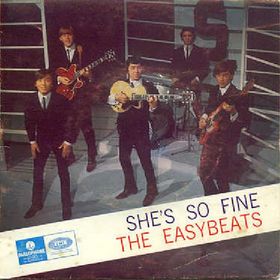
"Say that your mine / "For my woman" /
The old oak tree" / "She's so fine"
Feb. 1966
Easy As Can Be
(Parlophone GEPO-70028)

4 Aug 1966
Easyfever
(Parlophone
GEPO-70032)
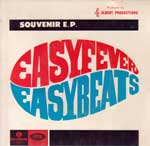
"Too Much" / "I'll
Make You Happy" // "A Very Special Man" / "Tryin' So Hard"
1966
Swing the Jingle for
Coca
Cola (EMI Custom, PRS 1610)
Various artists one-sided EP, includes Easybeats Coke Jingle #
1 (Wright-Young)
Nov. 1966
Friday On My Mind (Parlophone GEPO-70041)
1967
Heaven And Hell
(Parlophone GEPO-70046)
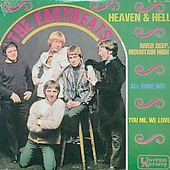
"Heaven And Hell" / "River Deep Mountain High" // "All Gone Boy" / "You Me We Love"
1968
Easyfever Vol. 2 (Parlophone GEPO-70048)
Nov 1979
Mean Old Lovin'
(Raven RV-01)
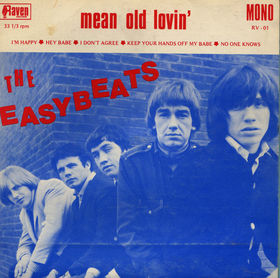
"Mean Old Lovin'" / "I'm
Happy" / "Hey Babe" // "I Don't Agree" / "Keep Your Hands off My Babe"
/ "No One Knows"
1000 copies only. All songs from Easybeats first recording
sessions, 1965.
Nov 1980
Son of Easyfever (Raven
RV-08)
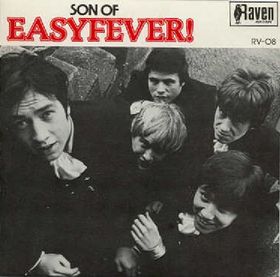
Side 1:
1. "Find My Way Back Home" 2.41
(Pegues-Lambert)
[recorded for a 1965 TV spot]
2. "Coke Jingle 1966" [to the tune "Come
and See
Her"]
3. "Mandy" 2.17 (Wright-Young) [from the
unreleased
first UK Abbey Road sessions]
Side 2:
1. "I'm Just Trying" 2.16 [Central Sound
Studio demo, 1968]
2. "Look Out I'm on the Way Down" 2.30
[Central Sound Studio demo, 1968]
1982
Son of Son of Easyfever (Raven RV-11)
[no image available]
Side 1:
1. All Gone Boy 2.14 [out-take from the
UK 'Good
Friday' LP]
2. Hound Dog 3.15 (Lieber/Stoller)
[released on
the German LP 'The Easybeats' 1967]
3. Interview/Coke Ads [to the tune
'Sorry']
Side 2:
1. Watch Me Burn (2nd half) [demo from
Central
Sound Studio, London, 1968]
2. Where Did You Go Last Night 2.50
[from '67
Olympic sessions for 'scrapped' 2nd UK LP]
3. Little Red Bucket 2.34 [demo tape
from the
Central Sound Studio, 1968]
Albums
23 Sep 1965
Easy
(Parlophone PMCO-7527)
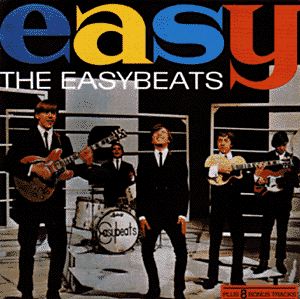
1. "It's So Easy" 2.09 (Wright-Young)
2. "I'm a Madman" 2.51 (Wright-Young)
3. "I Wonder" 1.48 (Vanda)
4. "She Said Alright" 2.13 (Young)
5. "I'm Gonna Tell Everybody" 2.03 (Fleet)
6. "Hey Girl" 2.09 (Wright-Young)
7. "She's So Fine" 2.06 (Wright-Young)
8. "You Got It off Me" 2.27 (Wright-Young)
9. "Cry Cry Cry" 2.01 (Young)
10. "A Letter" 1.38 (Wright-Young)
11. "Easy Beat" 2.38 (Vanda)
12. "You'll Come Back Again" 1.54 (Young)
13. "Girl on My Mind" 3.02 (Wright-Young)
14. "Ya Can't Do That" 2.25 (Wright-Young)
Bonus tracks on 1992 Repertoire CD reissue (REP 4284-2):
15. "For My Woman" 3.06 [single A-side March 1965]
16. "Say That You're Mine" 2.44 [B-side For My Woman]
17. "The Old Oak Tree" 3.02 [B-side She's So Fine]
18. "Friday on My Mind" 2.40 [different mix from the 1967 Shel
Talmy tapes, Olympic Studio]
19. "Lisa" (rough mix) 3.06 [different mix from the 1967 Shel
Talmy tapes, Olympic Studio]
20. "Find My Way Back Home" 2.41 (Pegues/Lambert) [recorded
for a 1965 TV spot]
21. "No One Knows" 2.20 (Wright-Young) [from the first
recording sessions in 1965]
22. "She's So Fine" (live 1965 at Myer Music Bowl, Melbourne)
2.22 (Wright-Young) [from 'Albert Archives' LP]
24 March 1966
It's 2 Easy (Parlophone PMCO-7530)
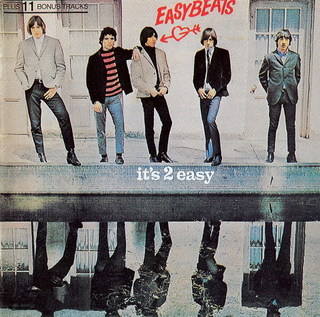
1. Let Me Be 2.06 (Wright-Young)
2. You Are the Light 1.55 (Wright-Young)
3. Women 2.35 (Wright-Young)
4. Come and See Her 2.41 (Wright-Young)
5. I'll Find Somebody To Take Your Place 3.02
(Wright-Young)
6. Someway, Somewhere 2.20 (Wright-Young)
7. Easy As Can Be 2.32 (Wright-Young)
8. I Can See 2.12 (Wright-Young)
9. Sad and Lonely and Blue 2.16 (Wright-Young)
10. Somethin' Wrong 2.16 (Wright-Young)
11. In My Book 3.08 (Wright-Young)
12. What About Our Love 1.54 (Fleet)
13. Then I'll Tell You Goodbuy 2.33
14. Wedding Ring 2.01 (Wright-Young)
CD BONUS TRACKS (Repertoire
REP 4302-2)
15. Me Or You 3.05 (Wright-Young) [B-side Wedding Ring]
16. Too Much 1.46 (Wright-Young) [on Easyfever EP]
17. I'll Make You Happy 3.09 (Wright-Young) [on Easyfever EP]
18. A Very Special Man 2.21 (Wright-Young) [on Easyfever EP]
19. Tryin' So Hard 2.46 (Wright-Young) [on Easyfever EP]
20. Friday on My Mind (mono version) 2.42 [on German 1966
single, United Artists 67097]
21. Made My Bed Gonna Lie in It 2.14 (Young) [different mix
from the 1967 Shel Talmy tapes]
22. Happy Is the Man 2.54 [different mix from the 1967 Shel
Talmy tapes]
23. How You Doing Now 2.00 (Wright-Young) [previously
unreleased]
24. All Gone Boy 2.14 [recorded in 1967; issued on
Australian/Italian EP 'Happy Is the Man' 30 Nov 1967]
25. Mandy 2.17 (Wright-Young) [from the unreleased first UK
Abbey Road sessions]
3 Nov 1966
VOLUME 3
(Australian LP:
Parlophone PMCO-7537)
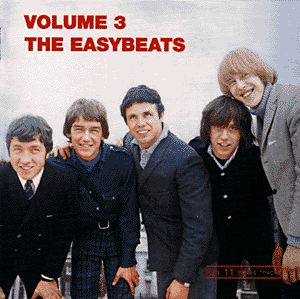
1. Sorry 2.35 (Wright-Young)
2. Funny Feelin' 2.28 (Wright-Young)
3. Say You want Me 2.07 (Wright-Young)
4. You Said That 2.32 (Wright-Young)
5. Goin' out of My mind 2.41 (Wright-Young)
6. Not in Love with You 2.37 (Wright-Young)
7. Promised Things 2.25 (Wright-Young)
8. The Last Day of May 1.56 (Wright-Young)
9. Today 2.14 (Fleet)
10. My My My 2.03 (Wright-Young)
11. Dance of the Lovers 2.56 (Wright-Young)
12. What Do You Want Babe 2.23 (Wright-Young)
13. Can't You Leave Her 1.56 (Wright-Young)
CD BONUS TRACKS (Repertoire REP 4303-2, 1993)
14. Hound Dog 3.15 (Lieber/Stoller) [released on the German
LP 'The Easybeats' 1967]
15. Do You Have a Soul 3.02 [different mix from the 1967
Shel Talmy tapes, Olympic Studio]
16. Saturday Night 2.37 [different mix from the 1967 Shel
Talmy tapes]
17. My Old Man's Is a Groovy Old Man 2.31 [instrumental
version from the Shel Talmy tapes]
18. The Easybeats-Medley 3.37 [previously unreleased]
19. Mean Old Lovin' 2.03 [from the first recording sessions
in 1965]
20. I'm Happy 1.53 [from the first recording sessions in
1965]
21. Hey Babe 1.53 [from the first recording sessions in 1965]
22. I Don't Agree 1.39 [from the first recording sessions in
1965]
23. Keep Your Hands off My Babe 2.15 [from the first
recording sessions in 1965]
24. I'm Just Trying 2.16 [Central Sound
Studio demo, 1968]
May 1967
Good Friday / The Easybeats / Friday On My Mind (United Artists
SULP 1167, UK / United Artists 669143, Germany / United Artists 6588, USA)
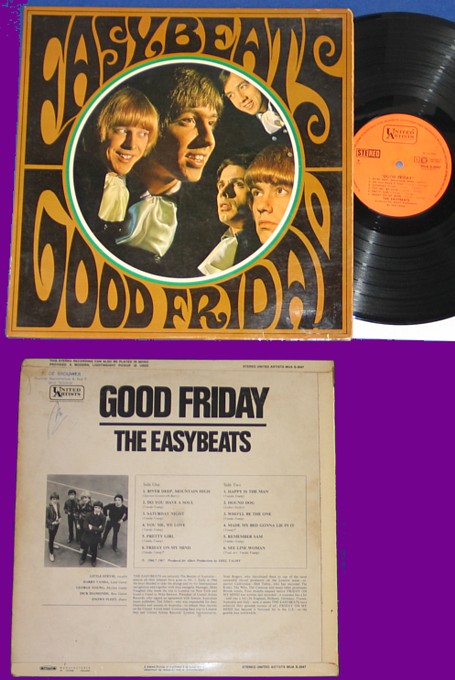 |
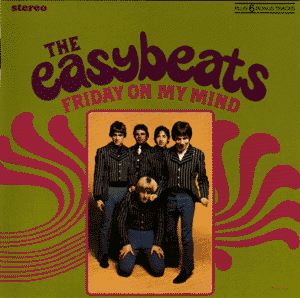 |
| The UK / European Good Friday LP |
The US version, titled Friday On My Mind |
1. "River Deep, Mountain High" 3.55
(Spector/Greenwich/Barry)
2. "Do You Have a Soul" 2.38 [full length 3.38
version on US LP]
3. "Saturday Night" 3.25
4. "You Me, We Love" 3.20
5. "Pretty Girl" 2.15
6. "Friday on My Mind" 2.40
7. "Happy is the Man" 2.40
8. "Hound Dog" 3.14 (Lieber/Stoller)
9. "Who'll Be the One" 2.33
10. "Made My Bed, Gonna Lie in It" 2.04 (Young)
11. "Remember Sam" 2.28
12. "See Line Woman" 3.08 (traditional)
Bonus tracks on Repertoire CD reissue (REP 4162-2)
13. "Heaven and Hell" 2.38 [single A-side June 1967]
14. "Do You Have a Soul" 3.38 [US full length version]
15. "All Gone Boy" 2.30 [different mix from the 1967 Shel
Talmy tapes]
16. "You Me, We Love" 3.20 [different mix from the 1967 Shel
Talmy tapes]
17. "Lisa" 3.06 [alternate mix from the 1967 Shel Talmy tapes]
Recorded at Olympic Studios in London; produced by Shel Talmy / Glyn
Johns.
1 June 1967
The Best Of The Easybeats + Pretty Girl (Parlophone PMCO-7541)
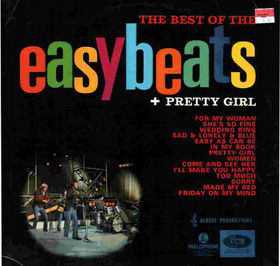
Side 1:
1. For My Woman 3.06
2. She's So Fine 2.06
3. Wedding Ring 2.01
4. Sad, Lonely & Blue 2.16
5. Easy As Can Be 2.32
6. In My Book 2.38
7. Women (Make You Feel Alright) 2.35
Side 2:
1. Pretty Girl 2.15
2. Come and See Her 2.41
3. I'll Make You Happy 3.09
4. Too Much 1.46
5. Sorry 2.35
6. Made My Bed, Gonna Lie in It 2.04
7. Friday on My Mind 2.40
17 Oct 1968
Vigil (Parlophone PMCO-7551)
(United Artists SULP 1193, stereo, ULP 1193, mono, UK / United Artists
669170, Germany)
US title: Falling Off The Edge Of The World ((United Artists UAS-6667)
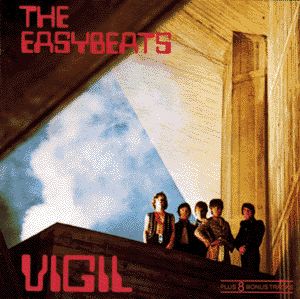
Australian version
Side 1:
1. Good Times 3.25
2. See Saw 2.20
3. Fancy Seeing You Here 2.35
4. Sha, La, La, La, Leah
5. What in the World
6. Bring a Little Lovin'
Side 2:
1. Land of Make Believe 3.10
2. We All Live Happily 4.01
3. Falling off the Edge of the World 2.58
4. The Music Goes Round My Head 2.50
5. Come in You'll Get Pneumonia 3.44
(Vanda/Young/Cahill)
6. Hello How Are You 3.19
UK/European version:
Side 1:
1. Good Times 3.25
2. What in the World
3. Falling off the Edge of the World 2.33 ['second
version']
4. Music Goes Round My Head 2.50
5. Can't Take My Eyes off of You 3.34
(Crewe/Gaudio)
6. Sha La La
7. Come on in You'll Get Pneumonia 3.44
(Vanda/Young/Cahill)
Side 2:
1. See Saw
2. Land of Make Believe 3.10
3. Fancy Seeing You Here 2.35
4. Hello How Are You 3.19
5. Hit the Road Jack (Mayfield)
6. We All Live Happily Together 4.01
7. I Can't Stand It 2.55 (Chambers)
U.S. version, Falling Off The Edge of the World
Side 1:
1. Gonna Have a Good Time 3.23 [aka "Good Times"]
2. What in the World 2.15
3. Falling off the Edge of the World 2.33 [US
version, recorded at A&R Studios, New York, late 1967]
4. The Music Goes Round My Head 2.47
5. Can't Take My Eyes off of You 3.30
6. Come In You'll Get Pneumonia 3.23
Side 2:
1. See Saw 2.32
2. Land of Make Believe 3.10
3. Fancy Seeing You Here 2.30
4. Hello, How Are You 3.14
5. Hit the Road Jack 2.49
6. I Can't Stand It 2.52 (US LP: )
1992 Repertoire CD version (REP 4240-2)
1. Good Times 3.23
2. What in the World 2.15
3. Falling off the Edge of the World 2.33 [US
version, recorded at A&R Studios, New York, late 1967]
4. The Music Goes Round My Head 2.47
5. Can't Take My Eyes off of You 3.30
6. Sha La La 3.04
7. Come in You'll Get Pneumonia 3.23
8. See Saw 2.32
9. Land of Make Believe 3.10
10. Fancy Seeing You Here 2.30
11. Hello How Are You 3.14
12. Hit the Road Jack 2.49
13. We All Live Happily Together 4.04
14. I Can't Stand It 2.52
15. Good Times 3.14 [unreleased alternative mix with
different vocals]
16. Lay Me Down and Die (Instrumental) 2.54 [single A-side
Nov 1968]
17. Lay Me Down and Die (vocal version) 2.48 [from 'Best of
the Easybeats Vol. 2']
18. Bring a Little Lovin' 2.20 [from Australian LP]
19. The Music Goes Round My Head (fast version) 2.16
[Italian 1968 single A-side]
20. Hello How Are You (original first version) 3.54 [from
'Best of the Easybeats Vol. 2']
21. Come in You'll Get Pneumonia (first mix) 3.18 [B-side
German 1968 single 'Hello How Are You']
22. Falling off the Edge of the World (second version) 2.33
[from UK 'Vigil' LP]
Recorded at Pye Studios 2 and Central Sound Studios, London, 1968
August 1969 / UK Nov 1969
Friends (Australia:
Polydor 184246 / UK: Polydor 2482010 / Germany Polydor
2482010)
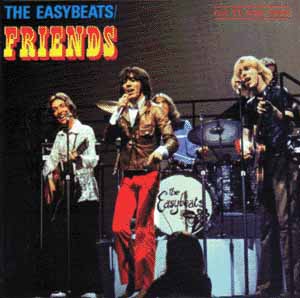
1. St. Louis 3.09
2. Friends 3.43 (Russel)
3. Watching the World (Go by) 2.33 (Russel)
4. Can't Find Love 3.25
5. Holding on 3.36 (Russel)
6. I Love Marie 2.37 (Russel)
7. Rock and Roll Boogie 2.26 (Russel)
8. Tell Your Mother 5.20 (Russel)
9. The Train Song 3.29 (Russel)
10. What Becomes of You My Love 3.15 (Russel)
11. Woman You're on My Mind 4.31 (Russel)
Bonus tracks on 1992
Repertoire CD reissue (REP 4278-2)
12. Peculiar Hole in the Sky 2.57 [single A-side 1969]
13. Gonna Make It (Instrumental) 3.13 (Vanda) [B-side 'I
Love Marie' Nov 1969]
14. H.P. Man 2.42 [B-side 'Peculiar Hole in the Sky']
15. Down to the Last 500 (2.40) [from 'Best of the Easybeats
Vol. 2']
16. My Old Man's Is a Groovy Old Man 2.22 [from 'Best of the
Easybeats Vol. 2']
17. Such a Lovely Day 3.11 [from 'Best of the Easybeats Vol.
2']
18. Who Are My Friends 3.40 (Russel) [alternate
UK album version of 'Friends']
19. Look Out I'm on the Way Down 2.30 [Central Sound
Studio demo, 1968]
20. Little Red Bucket 2.34 [Central Sound
Studio demo, 1968]
21. Remember Sam 2.28 [different mix from the 1967 Shel
Talmy tapes, Olympic Studio]
22. Pretty Girl 2.15 [different mix from the 1967 Shel Talmy
tapes, Olympic Studio]
Recorded in London 1969; most tracks on original LP were Central Sound demos, released without the group's approval.
9 Oct 1969
Best of The Easybeats Vol. 2 (Parlophone
PMCO-7555)
[no image available]
1. Peculiar Hole in the Sky 2.57
2. H.P. Man 2.42
3. My Old Man's Is a Groovy Old Man 2.22
4. Such a Lovely Day 3.11
5. Good Times 3.23
6. Down to the Last 500 (2.40)
7. Hello How Are You (original first version) 3.54
8. Heaven and Hell 2.38
9. Come in You'll Get Pneumonia (first mix) 3.18
10. Lay Me Down and Die (vocal version) 2.48
11. Do You Have a Soul? 2.38
12. Land of Make Believe 3.10
10 Oct 1977
THE SHAME JUST DRAINED (Albert Productions APLP-026)
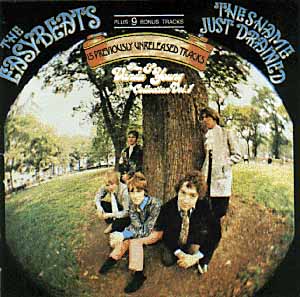
1. Little Queenie 2.41 (Berry) [from the 2UW
Theatre sessions in Sydney, 1964]
2. Baby I'm a Comin' 2.02 (Wright/Vanda/Young)
[the very first track recorded in UK, 1966]
3. Lisa 3.14 [recorded for the UK LP 'Good
Friday'; only released on an Australian & French EP 1976]
4. I'm on Fire 2.21 [Central Sound
Studio demo, London, 1968]
5. Wait a Minute 2.42 [Central Sound
Studio demo, London, 1968]
6. We'll Make It Together 2.41 [from 1967 Olympic
sessions for the 'scrapped' 2nd UK LP]
7. Peter 3.01 [Central Sound
Studio demo,
London, 1968]
8. Me and My Machine 2.27 [Central Sound
Studio demo, London, 1968]//
9. The Shame Just Drained 2.43 [Central Sound
Studio demo, London, 1968]
10. Mr. Riley of Higginbottom & Clive 2.30 [from
Olympic sessions for 'scrapped' 2nd UK LP]
11. Kelly 3.16 [Central Sound
Studio demo, London, 1968]
12. Where Old Men Go 2.32 [from 1967 Olympic sessions for
the 'scrapped' 2nd UK LP]
13. Johnny No-One 2.31 [Central Sound
Studio demo,
London, 1968]
14. Amanda Storey 2.48 [from 1967 Olympic sessions for the
'scrapped' 2nd UK LP]
15. Station on the Third Avenue 2.55 [from Olympic sessions
for 'scrapped' 2nd UK LP]
CD BONUS TRACKS (CD 1993:
Repertoire, CD REP 4304-2)
16. Do You Have a Soul (3rd version) 3.05 [from the 1967
Shel Talmy tapes, Olympic Studio]
17. Where Did You Go Last Night (instrumental) 2.55
[unreleased from 1967 Shel Talmy tapes]
18. Watch Me Burn 3.19 [Central Sound
Studio demo,
London, 1968]
19. Where Did You Go Last Night 2.50 [from '67 Olympic
sessions for 'scrapped' 2nd UK LP]
20. Heaven and Hell 2.41 [censored US version, contains one
changed lyric line]
21. Happy Is the Man 2.39 [previously unreleased alternate
take]
22. Land of Make Believe 3.14 [rough mix, different from
European LP mixes]
23. Coke Jingle # 1 (1.03) (Wright-Young) [from an
Australian Coke promo EP 1966]
24. Coke Ads # 2 & 3 (1.51) (Wright-Young) [Coke
promotional jingles from 1969]
March 1980
Albert Archives (Albert Productions APLP-037) LP
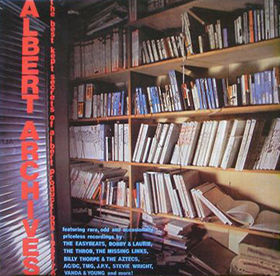
includes two rare Easybeats tracks:
- "All Gone Boy" 2.30 - different mix from the 1967 Shel Talmy tapes, Olympic Studio
- "She's So Fine" (live 1965 at
Myer Music Bowl, Melbourne) 2.22
17 Nov 1980
Absolute Anthology 1965-1969 (Albert Productions APM 1/2) 2LP
also released as a 3-LP set (APLP-026) with same tracks
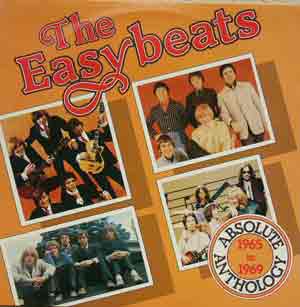
Track listing for 3LP version:
LP #1
1. For My Woman 3.02
2. Say That You're Mine 2.40
3. She's So Fine 2.02
4. Wedding Ring 1.58
5. Easy As Can Be 2.28
6. Sad and Lonely and Blue 2.10
7. You Said That 2.32//
8. You Got It Off Me 2.22
9. You Can't Do That 2.22
10. Funny Feeling 2.25
11. In My Book 3.05
12. Women 2.30
13. Come and See Her 2.38
14. I'll Make You Happy 3.07
15. Too Much 1.45
LP #2:
1. Sorry 2.30
2. Made My Bed, Gonna Lie in It 2.17
3. Friday on My Mind 2.46
4. Pretty Girl 2.20
5. Remember Sam 2.32
6. Who'll Be the One 2.34
7. Do You Have a Soul 2.58//
8. Heaven and Hell 2.38
9. Hello How Are You 3.56
10. Come in You'll Get Pneumonia 2.32
11. Good Times 3.23
12. Bring a Little Lovin' (demo version) 2.20
13. The Music Goes round in My Head 2.16
14. Falling off the Edge of the World 2.33
LP #3:
1. The Shame Just Drained 2.40
2. What in the World 2.15
3. Land of Make Believe 3.10
4. Peculiar Hole in the Sky 2.48
5. Lisa 3.10
6. Saturday Night 3.24
7. Amanda Story 2.43//
8. Down to the Last 500 2.38
9. Lay Me down and Die 2.48
10. Wait a Minute 2.37
11. I Love Marie 2.35
12. Rock and Roll Boogie 2.27
13. Can't Find Love 3.25
14. St. Louis 3.25
2-LP version includes all the tracks on the 3-LP set:
Side 1 begins with "For
My Woman" and ends with "Women"
Side 2 starts with "Come
& See Her" and ends with "Heaven & Hell".
Side 3 begins
with "Hello How Are You" and stops at "Peculiar Hole In The Sky"
Side 4 begins at "Lisa" and wraps up with "St. Louis".
1982
The Raven EP LP (RVLP-06)
Compilation of the three Raven EPs from 1979, 1980 and 1982.
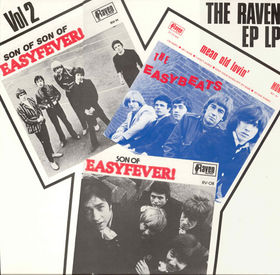
Side 1:
1. Coke Jingle 1966 [to the tune 'Come and See
Her']
2. Find My Way Back Home 2.41 (Pegues/Lambert)
[recorded for a 1965 TV spot]
3. Mean Old Lovin' 2.03
4. I'm Happy 1.53
5. Hey Babe 1.53
6. I Don't Agree 1.39
7. Keep Your Hands off My Babe 2.15
8. No One Knows 2.20
9. Interview/Coke Ads [to the tune
'Sorry']
Side 2:
1. All Gone Boy 2.14 [out-take from the UK 'Good
Friday' LP]
2. Hound Dog 3.15 (Lieber/Stoller) [released on
the German LP 'The Easybeats' 1967]
3. I'm Just Trying 2.16 [Central
Sound demo, 1968]
4. Look Out I'm on the Way Down 2.30 [Central
Sound demo, 1968]
5. Mandy 2.17 (Wright-Young) [from the unreleased
first UK Abbey Road sessions]
6. Where Did You Go Last Night 2.50 [from '67
Olympic sessions for 'scrapped' 2nd UK LP]
7. Little Red Bucket 2.34 [Central
Sound demo, 1968]
8. Watch Me Burn (2nd half) [Central
Sound demo, 1968]
1995
Live - Studio And Stage ... they called it easyfever (Raven RVCD-40)
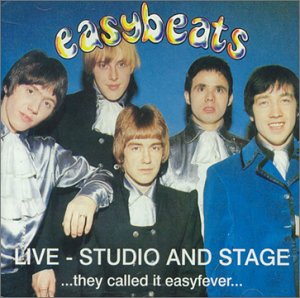
1. I Keep Forgetting (Lieber/Stoller) [live. never
recorded in studio by Easybeats]
2. Mother-in-Law (Toussaint) [live, never recorded in
studio by Easybeats]
3. Pretty Girl
4. Heaven & Hell
5. Made My Bed, Gonna Lie in It (Young)
6. Saturday Night
7. Who'll Be the One?
8. Hello, How Are You?
9. falling off the Edge of the World
10. Down to the Last 500
11. River Deep, Mountain High (Greenwich/Barry/Spector)
12. What in the World?
13. Sorry (Wright-Young)
14. In My Book (Wright-Young)
15. I'll Make You Happy (Wright-Young)
16. She's So Fine (Wright-Young)
17. Wedding Ring (Wright-Young)
18. For My Woman (Wright-Young)
19. St. Louis
20. Friday on My Mind
Tracks 1-12: U.K. radio broadcasts 1967-68
Tracks 13-15: Live at Festival Hall, Melbourne, Australia, 21 May 1967
Tracks 16-20: Live on national reunion tour, Sydney Entertainment Centre, 7
Nov 1986.
1999
Gonna Have A Good Time (Sin-Drome/Retroactive SD 8936)
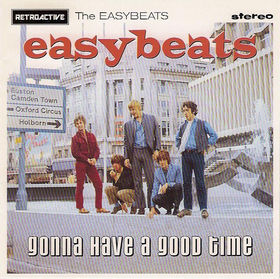
1. Come and See Her
2. Women (Make You Feel Alright)
3. In My Book
4. Friday on My Mind
5. Made My Bed (Gonna Lie In It)
6. Who'll Be the One
7. Saturday Night
8. Heaven and Hell
9. Pretty Girl
10. The Music Goes Round My Head
11. Come in You'll Get Pneumonia
12. Hello How Are You?
13. Falling off the Edge of the World
14. Remember Sam
15. The Land of Make Believe
16. We All Live Happily Together
17. Good Times
18. Lay Me Down and Die (instrumental)
19. St. Louis
20. Can't Find Love
21. (Who Are My) Friends
22. Rock and Roll Boogie
2003
The Very Best of The
Easybeats: Friday On My Mind (Varese Sarabande)
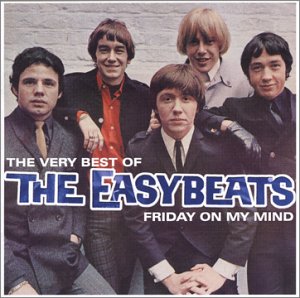
1. Sorry (2:35)
2. I'll Make You Happy (3:11)
3. Make You Feel Alright (Women) (2:36)
4. Friday on My Mind (2:43)
5. Made My Bed: Gonna Lie in It (2:10)
6. Who'll Be the One (2:41)
7. Pretty Girl (2:21)
8. Remember Sam (2:35)
9. Heaven and Hell (2:45)
10. Falling Off the Edge of the World
(Seeing You
With Him) (U.S. Only Mono (3:09)
11. TheMusic Goes Round My Head (European
Only Single
Version)(Version) (2:20)
12. Hello, How Are You (3:19)
13. Come In, You'll Get Pneumonia (3:46)
14. Bring a Little Lovin' (2:26)
15. Fancy Seeing You Here (2:36)
16. Land of Make Believe (3:22)
17. Gonna Have a Good Time (Good Times) 3:26
18. St. Louis
3:12
2004
The Complete Easybeats
(Albert Productions / Sony BMG 82876866332)
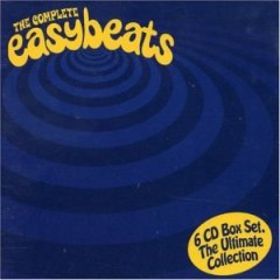
CD 1 - Easy
1. It's So Easy
2. I'm A Madman
3. I Wonder
4. She Said Alright
5. I'm Gonna Tell Everybody
6. Hey Girl
7. She's So Fine
8. You Got It Off Me
9. Cry Cry Cry
10. A Letter
11. Easy Beat
12. You'll Come Back Again
13. Girl On My Mind
14. You Can't Do That
15. For My Woman
16. Say That Your Mine
17. The Old Oak Tree
18. Friday On My Mind
19. Lisa (Alternate Mix)
20. Find My Way Back Home
21. No One Knows
22. She's So Fine (Live) |
CD 2 - It's Too Easy
1. Let Me Be
2. You Are The Light
3. Women (Make You Feel Alright)
4. Come And See Her
5. I'll Find Somebody To Take Your Place
6. Someway, Somewhere
7. Easy As Can Be
8. I Can See
9. Sad And Lonely And Blue
10. Somethin' Wrong
11. In My Book
12. What About Our Love
13. Then I'll Tell You Goodbye
14. Wedding Ring
15. Me Or You
16. Too Much
17. I'll Make You Happy
18. A Very Special Man
19. Friday On My Mind
20. Tryin´ So Hard
21. Made My Bed (Gonna Lie In It) (Alt Mix)
22. Happy Is The Man
23. How You Doing Now
24. All Gone Boy (Million Dollar Baby)
25. Mandy |
CD 3 - Volume
3
1. Sorry
2. Funny Feelin´
3. Say You Want Me
4. You Said That
5. Going Out Of My Mind
6. Not In Love With You
7. Promised Things
8. The Last Day Of May
9. Today
10. My My My
11. Dance Of The Lovers
12. What Do You Want Babe
13. Can't You Leave Her
14. Hound Dog
15. Do You Have Soul? (Alt Version)
16. Saturday Night (Alt Version)
17. My Old Man's A Groovy Old Man (Alt Version)
18. Historeasy (Alt Version)
19. Mean Old Lovin´
20. I'm Happy
21. Hey Babe
22. I Don't Agree
23. Keep Your Hands Off My Babe
24. I'm Just Trying (Alt Version) |
CD 4 - The
Shame Just Drained
1. Little Queenie
2. Baby I'm Comin´ (Alt Version)
3. Lisa
4. I'm On Fire (Alt Version)
5. Wait A Minute (Alt Version)
6. We'll Make It Together (Alt Version)
7. Peter (Alt Version)
8. Me And My Machine (Alt Version)
9. The Shame Just Drained (Alt Version)
10. Mr Riley Of Higginbottom & Clive (Alt Version)
11. Kelly (Alt Version)
12. Where Old Men Go (Alt Version)
13. Johnny No One (Alt Version)
14. Amanda Storey
15. Station On Third Avenue (Alt Version)
16. Do You Have A Soul? (Alt Version)
17. Where Did You Go Last Night (Alt Version)
18. Watch Me Burn (Alt Version)
19. Where Did You Go Last Night (Instrumental)
20. Heaven & Hell (Alt Version)
21. Happy Is The Man (Alt Version)
22. Land Of Make Believe (Alt Version)
23. Coke Jingle #1 - Come And See Her (Alt Version)
24. Coke Jingle #2
25. Coke Jingle #3 |
CD 5 - Friday On My Mind
1. River Deep Mountain High
2. Do You Have Soul? (Edit Lp Version)
3. Saturday Night
4. You Me, We Love
5. Pretty Girl
6. Friday On My Mind (Album Version)
7. Happy Is The Man
8. Hound Dog
9. Who'll Be The One You Love
10. Made My Bed (Gonna Lie In It)
11. Remember Sam
12. See Line Woman
13. Heaven & Hell (Alt Version)
14. Do You Have Soul?
15. Women (Make You Feel Alright)
16. All Gone Boy (Million Dollar Baby) (Alt)
17. You Me, We Love (Alt Mix)
18. Lisa (Alternate Mix) |
CD 6 - Vigil
1. Good Times
2. What In The World
3. Falling Off The Edge Of The World
4. The Music Goes Round My Head
5. Can´T Take My Eyes Off Of You
6. Sha La La
7. Come In You'll Get Pneumonia
8. See Saw
9. Land Of Make Believe
10. Fancy Seeing You Here
11. Hello, How Are You?
12. Hit The Road Jack
13. We All Live Happily
14. I Can't Stand It
15. Good Times (Alt Version)
16. Lay Me Down And Die (Instrumental)
17. Lay Me Down And Die (Vocal)
18. Bring A Little Lovin´
19. The Music Goes Round My Head (Fast)
20. Hello, How Are You? (Original Version)
21. Come In You'll Get Pneumonia (Single)
22. Falling Off The Edge Of The World (Alt Version) |
2005
The Very Best of The Easybeats - Friday on my mind
(Repertoire)

1. "River Deep, Mountain High"
(3:59)
2 Do You
Have a Soul (Edited Album
Version) (2:39)
3
Saturday Night (Mono Single Mix)
(3:26)
4 You Me,
We Love (Different Mix)
(3:23)
5 Pretty
Girl (Mono Single Mix) (2:17)
6 Friday
on My Mind (Mono Single
Mix) (2:42)
7 Happy
Is the Man (2:42)
8 Hound
Dog (3:19)
9 Who'll
Be the One (Mono Single
Mix) (2:38)
10 Made
My Bed Gonna Lie in It (2:08)
11
Remember Sam (2:34)
12 See
Line Woman (3:15)
13 Woman
(Make You Feel Alright)
(*) (2:36)
14 Do You
Have a Soul (Long
Version)(*) (2:59)
15 You
Me, We Love (Different
Mix)(*) (3:24)
16 Lisa
(Different Mix)(*) (3:13)
17 All
Gone Boy (Different Mix)(*)
(2:32)
18 Friday
on My Mind (Mono Single
Mix)(*) (2:42)
19 Made
My Bed Gonna Lie in It
(Mono Single Mix)(*) (2:08)
20 Who'll
Be the One (Mono Single
Mix)(*) (2:38)
21
Saturday Night (Mono Single
Mix)(*) (3:26)
22 Heaven
and Hell (Mono Single
Mix)(*) (2:43)
23 Pretty
Girl (Mono Single
Mix)(*) (2:17)
24 Heaven
and Hell (*) (2:42)
2005
The Easybeats: The
Singles As & Bs (Repertoire RR5039)
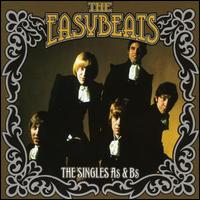
1. For My
Woman
2. Say That You're Mine
3. She's So Fine
4. Old Oak Tree
5. Wedding Ring
6. Me Or You
7. Sad Lonely & Blue
8. Easy As Can Be
9. Woman [Maybe You Feel Alright]
10. In My Book
11. Come & See Her
12. I Can See
13. Sorry
14. Funny Feeling
15. Friday On My Mind
16. Made My Bed, Gonna Lie In It /
17. Who'll Be The One
18. Do You Have A Soul
19. Saturday Night
20. Heaven And Hell
21. Pretty Girl /
22. Falling Off The Edge Of The World
23. Remember Sam
23. The Music Goes Round My Head
24. Come In You'll Get Pneumonia
25. Good Times
26. Hello How Are You
27. The Music Goes Round My Head - Fast Version Italy
28. The Land
Of Make
Believe
29. We All Live Happily
30. Lay Me Down & Die - Instrumental
31. See Line Woman
32. I Can't Stand It
33. St.Louis
34. Can't Find Love
35. Rock'n Roll Boogie
36. Woman You're On My Mind
37. Peculiar Hole In The Sky
38. H.P.Man
39. (Who Are My) Friends
Early 1970s Vanda-Young recordings
as Moondance, 19
June 1970
"Lazy River" / "Anna St Claire" (A&M AMS 792)
as Paintbox, 1970
"Get Ready For Love" / "Can I Get To Know You" (Youngblood YB
1013)
as Tramp, 6 November 1970
"Vietnam Rose" / "Each Day" (Youngblood YB ?) released in
Germany
with Grapefruit, 1971
"Sha Sha" / "Universal Party" (Deram DM 343)
as Haffy's Whisky
Sour, 1971
"Shot in the Head" / "Bye Bye Bluebird" (Deram DM 345)
as Vanda & Young,
1971?
"Lazy River" / "Free and Easy" (Albert Productions AP-9710)
References/Links
Thanks to Nick Warburton for additional information on Vanda-Young releases
Glenn A. Baker
liner notes for The Shame Just Drained (Raven,
1977) LP
liner notes for The Easybeats Absolute Anthology
(EMI, 1980) 2LP
All quotes (unless otherwise indicated)
are from Glenn Baker's notes for the LP version of the Absolute
Anthology
Paul Conn
Two Thousand Weeks: The First Thirty Years of Australian Rock
(Moonnlight Publications, 1993)
Noel McGrath
Australian Encyclopedia of Rock (Outback Press,
1978)
Australian Encyclopedia of Rock - 1979 Yearbook
(Outback Press, 1979)
Ian McFarlane
Encyclopedia of Australian Rock & Pop (Allen
& Unwin, 1999)
Chris Spencer,
Zbig Nowara & Paul McHenry
Who's Who of Australian
Rock (Five Mile Press, 2002)
Jonas Warstad
Easybeats Discography
http://www.discog.info/easybeats.html
Magnus Holmgren
Australian
Rock Database -The Easybeats
http://hem.passagen.se/honga/database/e/easybeats.html
Rate Your Music -
The Easybeats
http://rateyourmusic.com/artist/the_easybeats
Easyfever: The Easybeats Fan Site
http://www.geocities.com/SunsetStrip/Lounge/4044/
The Eaybeats on
YouTube:

 And just like the Beatles, the Easybeats became
prisoners of
their own fame. Fans followed them everywhere, routinely mobbing them
at airports, hotels and venues. On several occasions the group had
genuine reason to fear for their safety. When a fan magazine stupidly
printed the address of the Young's family home in the Sydney suburb of
Burwood, 300 female fans invaded; twenty managed to force their way
inside, trampling George's little brother Angus and pillaging the house
before being removed by police. The madness escalated through 1965 - a
near-riot broke out at a TV appearance in Sydney, and the hysteria
peaked in December with their notorious appearance at the 4BC
Sound Spectacular at Brisbane's Festival Hall.
And just like the Beatles, the Easybeats became
prisoners of
their own fame. Fans followed them everywhere, routinely mobbing them
at airports, hotels and venues. On several occasions the group had
genuine reason to fear for their safety. When a fan magazine stupidly
printed the address of the Young's family home in the Sydney suburb of
Burwood, 300 female fans invaded; twenty managed to force their way
inside, trampling George's little brother Angus and pillaging the house
before being removed by police. The madness escalated through 1965 - a
near-riot broke out at a TV appearance in Sydney, and the hysteria
peaked in December with their notorious appearance at the 4BC
Sound Spectacular at Brisbane's Festival Hall.





















